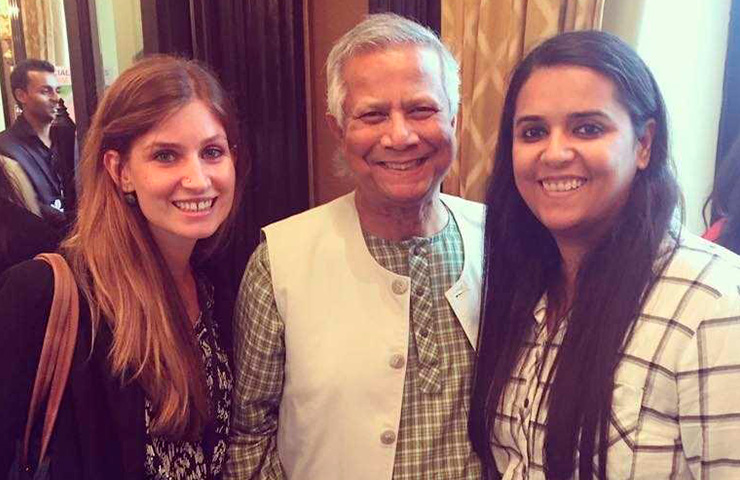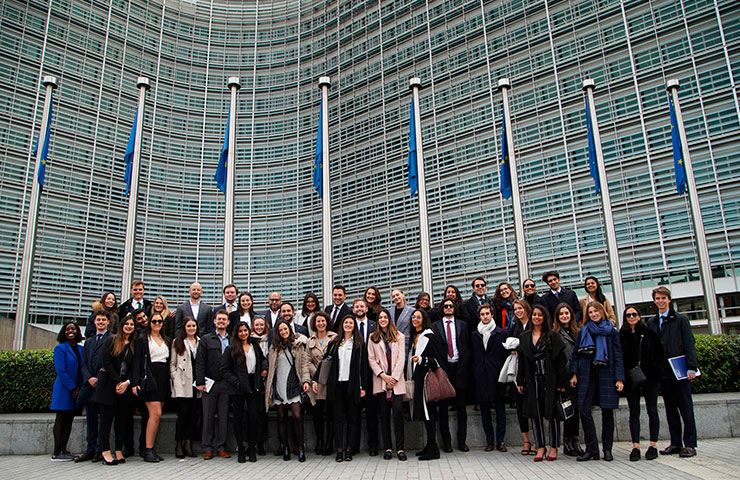18/03/2022
We uncover all you need to know about the APSIA alliance with Ángel Alonso Arroba, Vice Dean for Management and Development at IE School of Global and Public Affairs.
As a seasoned international relations expert, IE School of Global and Public Affairs Vice Dean Ángel Alonso Arroba certainly knows what a strong global organization looks like. Having worked for over thirteen years at the OECD, and in the national government as the official Ambassador-at-large for Spanish Global Citizenry, Ángel’s extensive experience makes him an authoritative voice on all things international relations.
We sat down with Ángel to get the full rundown on IE University’s membership to Association of Professional Schools of International Affairs (APSIA), one of the world’s most important educational alliances. Explaining the association’s mission, membership and the benefits that it offers IE School of Global and Public Affairs master’s students, Ángel also told us about the upcoming annual APSIA meeting—being held at our very own IE Tower in Madrid!
APSIA: Membership and what it means
Setting the record straight on APSIA, Ángel explained that the association brings together the world’s leading graduate schools specialized in international affairs. By collaborating with other educational institutions and the professional international affairs community, APSIA works to address common problems faced by all. In that sense, it’s a key community for sharing ideas and gathering information.
By being members, Ángel highlighted that member schools have a space to share best practices, identify how the discipline of foreign affairs is evolving, and show how academic institutions are adapting to offer a better student experience.
So, how does a school get to join APSIA? As Ángel told us, prospective members must demonstrate their excellence in graduate level international affairs education. APSIA member institutions bring together critical thinking, quantitative analysis, public communications, project management, and teamwork—all with deep regional, cultural, and economic expertise.

Currently, 40 schools from 10 different countries are members of APSIA, with IE School of Global and Public Affairs being the only member in Spain.
Other member schools include Georgetown, Columbia, Harvard, Yale, Princeton, Stanford, Sciences Po, Hertie and Singapore University.
In particular, Ángel stressed that APSIA schools hone in on the link between theory and practical issues, embracing the flexibility needed to navigate our changing world. APSIA teaching methods foster dynamic skill sets, providing students with the tools to evaluate trends across a global landscape.
APSIA’s mission and influence
According to Ángel, APSIA’s core mission is to provide the best professional education in international affairs as a means to advance global prosperity, peace, and security. In this sense, APSIA students, schools, and other partners are agents of positive change.
Ángel believes that the existence of APSIA also works to improve the field of foreign affairs academics overall. Member schools exchange experiences, identify trends, and collaborate to adapt to changing demands, ensuring that member schools remain at the cutting-edge of the discipline. In his view, APSIA provides an invaluable source of analysis, reporting and benchmarking to its member schools.
On the subject of influence, Ángel pointed out that APSIA members are consistently ranked as the best schools for international relations worldwide. Each year, the organization delivers a high percentage of students to the prestigious fellowships after graduation, while APSIA graduates are currently heads of state or senior cabinet officials in over 12 countries.
Spain’s only APSIA member school: IE University
All APSIA schools are held to incredibly high academic standards so that students graduate as fully prepared professionals, ready to work in the field of international relations. As Ángel highlighted, IE University’s APSIA membership is a testimony to the quality of the programs and courses taught at School of Global and Public Affairs. APSIA recognizes that a graduate in international relations from IE University has received a state-of-the-art education, acquiring the knowledge and skills to pursue a meaningful career in the sector.
Another component of that recognition, explained Ángel, comes from the unique level of connectivity that IE School of Global and Public Affairs has with international organizations.

Some of which, like the UN and OECD, are partners in the development of program content and curriculums.
What’s more, many IE School of Global and Public Affairs faculty members are recognized practitioners who bring extraordinary professional experience to the classroom. In Ángel’s view, this makes the school a strong contributor to the APSIA mission—alongside the commitment to student-focused innovation. This ensures that students get an experiential international relations education through simulations, case studies, capstones, original research, and immersion trips.
How being an APSIA member benefits students at IE University
For Ángel, the key student benefit of APSIA membership is the world-class network. The association connects a unique pool of international relations experts, providing students with access to the top practitioners worldwide. Equally, members of APSIA collaborate closely to facilitate opportunities for their students, creating a tight-knit community for sharing ideas and gathering information.
APSIA membership is also good news for career prospects. As Ángel told us, joint initiatives through the association enable monitoring of professional opportunities for recent graduates. At IE University, this is utilized by IE Talent & Careers in the support they provide to students.
APSIA’s annual meeting at the IE Tower in Madrid
Speaking about the upcoming APSIA annual meeting, Ángel was clear about the significance of IE University’s selection as the hosts. This will mark the first time that the annual meeting has taken place in Spain—an important milestone, since IE University is one of the very few European schools in APSIA.

Ángel also added that the meeting reflects IE School of Global and Public Affairs’ standing as one of the world’s best foreign policy and international relations schools.
With it’s diverse student body and expert faculty, being the APSIA annual meeting hosts is another reflection of the school’s commitment to top-quality education.
The IE School of Global and Public Affairs will be hosting this year’s annual meeting with a sense of both responsibility and opportunity. Ángel highlighted the responsibility that comes with hosting the first meeting of APSIA School Deans since the start of the COVID-19 pandemic—but this will also be a valuable opportunity to share lessons learned from the past years. There will be plenty to talk about in light of the changes that schools have undergone, including the shift to online learning and new obstacles to the mobility of international students.
What’s more, Ángel pointed out, the uncertain global context will make for some important academic discussions. In the past two years, the world has changed incredibly—and in just the past two weeks, the global balance of power has shifted. As Ángel explained, this offers a whole new context for geopolitics and global affairs, but also a window of opportunity to feature the work that IE School of Global and Public Affairs is doing. At the APSIA annual meeting and in the years to come, Ángel feels confident that IE University will become a home to discussions that impact the future direction of the discipline.








